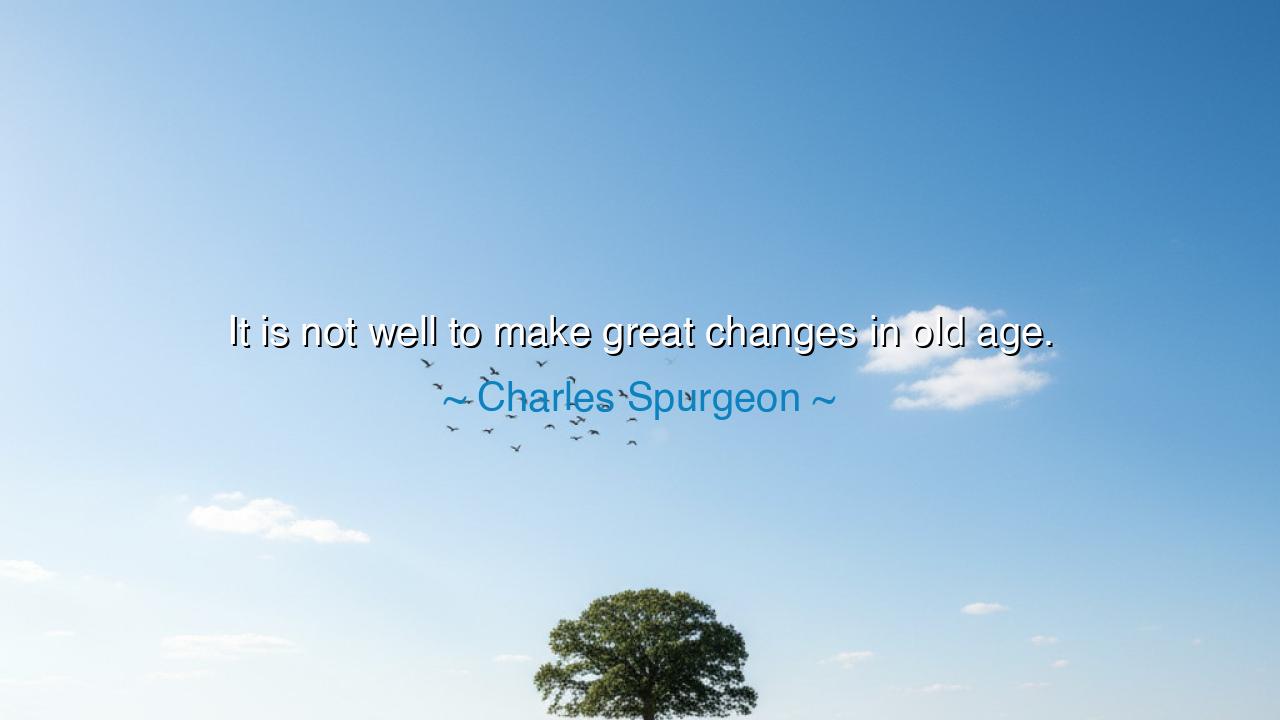
It is not well to make great changes in old age.






Harken, O children of wisdom, to the words of Charles Spurgeon, a man whose insight into the human condition speaks with clarity and grace: "It is not well to make great changes in old age." These words, though simple, carry within them a deep understanding of the natural order of life, a wisdom borne from the realization that the later years of one’s life are a time of reflection, consolidation, and peace—rather than radical upheaval. To make great changes in the twilight of life, Spurgeon suggests, is not merely unwise; it can also be a disruption to the delicate balance that age demands.
In the ancient world, the elder was seen as the keeper of wisdom, the one who had walked the long road of life and seen its many faces. The Greeks, with their great philosophers and scholars, revered the elder, not for their physical strength, but for the depth of their experience and the clarity of their vision. The elder’s role was to guide, to pass on wisdom to the young, and to maintain the traditions that kept societies grounded. The wisdom of age is often in the restraint of change, for the elder knows that the forces of time are to be honored, not recklessly challenged.
Yet, as Spurgeon wisely points out, there comes a time in life when the spirit of change must give way to the wisdom of consolidation. To chase after new endeavors, to radically alter the course of one’s life when the body begins to slow, is often a folly. The body that once moved with the energy of youth now bears the marks of age, and the mind, though still sharp in many ways, is often best served by reflecting upon what has been learned, rather than seeking to reinvent the wheel. The elder’s task is not to begin anew, but to shape the legacy of the life they have lived, to pass it on with the dignity and integrity that only age can bring.
Consider, O wise ones, the example of the ancient Roman statesman Cato the Elder, whose life was a testament to the virtue of restraint and experience. Cato spent his later years dedicated to preserving the values of Rome, rather than chasing new ambitions or reforms. His later years were marked not by a desire for personal power, but by a desire to ensure that his wisdom and values were passed down to the next generation. His life, long and full of service, shows us the importance of finding purpose not in the bold actions of youth, but in the quiet, steady influence of age.
In contrast, there are those who, in their later years, have sought to change the world without considering the fragility of their position. King Lear, from the great tragedy of Shakespeare, is a poignant example of an older man who, in his desperation, sought to shift the very foundations of his life. His desire for change, though driven by the best of intentions, brought him ruin. He failed to see that, in old age, what is needed is not a reckless abandonment of what came before, but a thoughtful reflection upon it. Lear’s tragic downfall reminds us of the dangers of seeking great change in our twilight years, when wisdom and self-awareness should be the guides.
Spurgeon’s wisdom speaks to us today, urging us to recognize the power of stability and reflection in the later years of life. It is not that change is inherently bad, but rather that age requires us to weigh carefully the changes we wish to make. It is a time to build upon the foundation that has been laid, to refine the virtues and wisdom accumulated over a lifetime, rather than attempting to lay down a new, untested foundation. The elder knows the power of balance, the importance of knowing when to hold steady and when to step back, giving way to the younger generation who will carry the torch forward.
Therefore, O children, let the words of Spurgeon remind you: age is a gift, one that comes with the understanding that there are seasons in life. Just as the seasons of nature follow a rhythm, so too must the seasons of our lives. In youth, there is change, growth, and expansion. But in age, there is the opportunity to consolidate, to reflect, and to share the wisdom of the years. Do not rush to make great changes when the time for reflection has come, but rather seek to preserve and build upon the wisdom of the past. It is in this way that you will live your later years with the dignity of the elder, leaving behind a legacy of wisdom that will inspire those who come after you.
Let the lesson be clear: in the later seasons of life, it is not the pursuit of change that defines us, but the wisdom to understand when to embrace stability, when to pass the torch, and when to let go. In this way, we honor the natural order of time and find peace in the grace of age.






AAdministratorAdministrator
Welcome, honored guests. Please leave a comment, we will respond soon